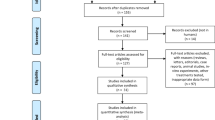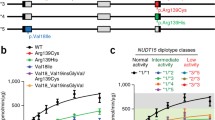Abstract
Pharmacogenetics is the growing field of study of genetic variations underlying interindividual differences in drug response. Inherited polymorphisms in genes coding for drug-metabolizing enzymes, transporters, and targets influence toxicity as well as efficacy associated with the medication. Thiopurines are agents widely used in hematologic malignancies, transplantation, and chronic inflammatory conditions. Myelosuppression is the commonly encountered dose-limiting toxicity. Polymorphisms in the thiopurine S-methyltransferase gene (TPMT), the predominant inactivating enzyme for thiopurines in hematopoietic tissue, are correlated with enzymatic activity of TPMT, thiopurine metabolism, and risk of clinical toxicity. In this chapter, we present TPMT genotype assessment that allows for prescribing pharmacogenetically guided doses to enhance patient safety and drug efficacy.
Access this chapter
Tax calculation will be finalised at checkout
Purchases are for personal use only
Similar content being viewed by others
References
Pui CH, Evans WE (2006) Treatment of acute lymphoblastic leukemia. N Engl J Med 354: 166–178
Relling MV, Dervieux T (2001) Pharmacogenetics and cancer therapy. Nat Rev Cancer 1:99–108
Meeker ND, Yang JJ, Schiffman JD (2010) Pharmacogenomics of pediatric acute lymphoblastic leukemia. Expert Opin Pharmacother 11:1621–1632
Krynetski E, Evans WE (2003) Drug methylation in cancer therapy: lessons from the TPMT polymorphism. Oncogene 22:7403–7413
Weiss ST, McLeod HL, Flockhart DA et al (2008) Creating and evaluating genetic tests predictive of drug response. Nat Rev Drug Discov 7:568–574
Relling MV, Gardner EE, Sandborn WJ et al (2011) Clinical Pharmacogenetics Imple mentation Consortium guidelines for thiopurine methyltransferase genotype and thiopurine dosing. Clin Pharmacol Ther 89:387–391
Relling MV, Hancock ML, Boyett JM et al (1999) Prognostic importance of 6-mercaptopurine dose intensity in acute lymphoblastic leukemia. Blood 93:2817–2823
Aarbakke J, Janka-Schaub G, Elion GB (1997) Thiopurine biology and pharmacology. Trends Pharmacol Sci 18:3–7
Tidd DM, Paterson AR (1974) Distinction between inhibition of purine nucleotide synthesis and the delayed cytotoxic reaction of 6-mercaptopurine. Cancer Res 34:733–737
Yan T, Berry SE, Desai AB et al (2003) DNA mismatch repair (MMR) mediates 6-thioguanine genotoxicity by introducing single-strand breaks to signal a G2-M arrest in MMR-proficient RKO cells. Clin Cancer Res 9:2327–2334
Tay BS, Lilley RM, Murray AW et al (1969) Inhibition of phosphoribosyl pyrophosphate amidotransferase from Ehrlich ascites-tumour cells by thiopurine nucleotides. Biochem Pharmacol 18:936–938
Krynetski EY, Krynetskaia NF, Yanishevski Y et al (1995) Methylation of mercaptopurine, thioguanine, and their nucleotide metabolites by heterologously expressed human thiopurine S-methyltransferase. Mol Pharmacol 47: 1141–1147
Evans WE, Hon YY, Bomgaars L et al (2001) Preponderance of thiopurine S-methy ltransferase deficiency and heterozygosity among patients intolerant to mercaptopurine or azathioprine. J Clin Oncol 19:2293–2301
Weinshilboum RM, Sladek SL (1980) Mercaptopurine pharmacogenetics: monogenic inheritance of erythrocyte thiopurine methyltransferase activity. Am J Hum Genet 32:651–662
McLeod HL, Lin JS, Scott EP et al (1994) Thiopurine methyltransferase activity in American white subjects and black subjects. Clin Pharmacol Ther 55:15–20
Yates CR, Krynetski EY, Loennechen T et al (1997) Molecular diagnosis of thiopurine S-methyltransferase deficiency: genetic basis for azathioprine and mercaptopurine intolerance. Ann Intern Med 126:608–614
McLeod HL, Pritchard SC, Githang’a J et al (1999) Ethnic differences in thiopurine methyltransferase pharmacogenetics: evidence for allele specificity in Caucasian and Kenyan individuals. Pharmacogenetics 9: 773–776
Collie-Duguid ES, Pritchard SC, Powrie RH et al (1999) The frequency and distribution of thiopurine methyltransferase alleles in Caucasian and Asian populations. Phar-macogenetics 9:37–42
Relling MV, Hancock ML, Rivera GK et al (1999) Mercaptopurine therapy intolerance and heterozygosity at the thiopurine S-methyltransferase gene locus. J Natl Cancer Inst 91:2001–2008
Evans WE (2002) Thiopurine S-methy-ltransferase: a genetic polymorphism that affects a small number of drugs in a big way. Pharmacogenetics 12:421–423
Ameyaw MM, Collie-Duguid ES, Powrie RH et al (1999) Thiopurine methyltransferase alleles in British and Ghanaian populations. Hum Mol Genet 8:367–370
Stocco G, Cheok MH, Crews KR et al (2009) Genetic polymorphism of inosine triphosphate pyrophosphatase is a determinant of mercaptopurine metabolism and toxicity during treatment for acute lymphoblastic leukemia. Clin Pharmacol Ther 85:164–172
Krishnamurthy P, Schwab M, Takenaka K et al (2008) Transporter-mediated protection against thiopurine-induced hematopoietic toxicity. Cancer Res 68:4983–4989
Acknowledgments
We would like to acknowledge Drs. William Evans, Mary Relling, and Kristine Crews for establishing clinical procedures for TPMT genotyping. We also thank Dr. Gabriele Stocco for reading the manuscript and insightful discussions, and Pam McGill for her technical assistance.
Author information
Authors and Affiliations
Editor information
Editors and Affiliations
Rights and permissions
Copyright information
© 2013 Springer Science+Business Media, New York
About this protocol
Cite this protocol
Yang, J.J., Bhojwani, D. (2013). Thiopurine S-Methyltransferase Pharmacogenetics in Childhood Acute Lymphoblastic Leukemia. In: Czader, M. (eds) Hematological Malignancies. Methods in Molecular Biology, vol 999. Humana Press, Totowa, NJ. https://doi.org/10.1007/978-1-62703-357-2_20
Download citation
DOI: https://doi.org/10.1007/978-1-62703-357-2_20
Published:
Publisher Name: Humana Press, Totowa, NJ
Print ISBN: 978-1-62703-356-5
Online ISBN: 978-1-62703-357-2
eBook Packages: Springer Protocols




